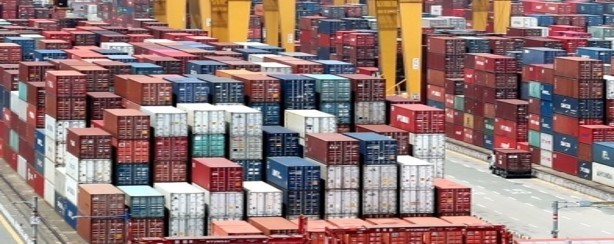 |
(Yonhap) |
South Korea’s top 100 companies by revenue saw overseas sales drop 19.8 percent in the second quarter year-on-year due to the global economic downturn caused by the pandemic, data showed Monday.
According to the Federation of Korean Industries, which analyzed the disclosure data of the nation’s 100 largest companies, their overseas sales declined 19.8 percent to 146.3 trillion won ($123 billion) in the April-June period from a year earlier.
This is compared with the first quarter. As the economic impact of COVID-19 was limited to China and other parts of Asia, overseas sales in the January-March period stood at 170.4 trillion won, up 0.65 percent on-year.
The Export-Import Bank of Korea’s recent data shows a similar pattern, with the nation’s overall exports in the second quarter falling 20.3 percent from a year earlier and 15.2 percent from the previous quarter.
All major industries -- steel, electronics, automobiles and auto parts, energy and chemicals -- suffered from weak overseas sales.
Automobiles and auto parts saw overseas sales plunge 36.5 percent from a year earlier as major carmakers such as Volkswagen, BMW, Mercedes-Benz and Audi suspended their global production lines. There was also a sharp drop in global demand.
The steel sector dropped 80.1 percent as demand for high-yield steel plates plunged following sluggish global auto sales.
Electronics declined 5.1 percent despite contact-free trends such as teleworking and online education. Energy and chemicals also fell 30.9 percent due to weak refining margins, a sharp drop in international oil prices and weak overseas demand in the wake of COVID-19.
By region, overseas sales dropped 24 percent in Asia, 12.6 percent in the Americas and 11.2 percent in Europe, respectively, during the period.
But sales in China at five companies -- Samsung Electronics, Hyundai Motor, LG Electronics, SK hynix and Hyundai Mobis -- increased 5.9 percent year-on-year and 19.6 percent from the previous quarter.
The stable performance seems to be due to the rapid recovery of the Chinese economy since investment, consumption and production reached their lowest point in February and March, as well as increased investment in new infrastructure such as 5G, artificial intelligence and internet of things for the nation’s key political event on May 21, the FKI said.
Kim Bong-man, head of the FKI’s international cooperation office, said, “The US, Germany and Japan poured huge amounts of money into the economies in the second quarter, but global business conditions for companies showed no signs of recovery.
“Foreign policies are necessary to expand special entry for businesspeople into major trade partners and cooperate with overseas governments to help Korean exporters.”
By Shin Ji-hye (
shinjh@heraldcorp.com)








